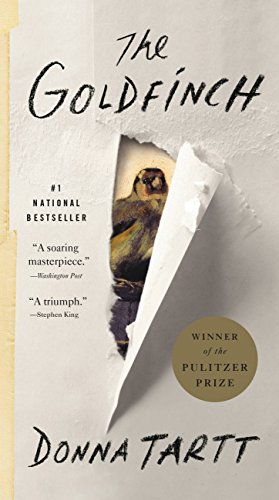One of the hundred books a year I read:
One of the hundred books a year I read:

The Goldfinch
Donna Tartt
Purchase Options:
Affiliate links pay me a small commission on purchases but have no impact on your price.
Share this book with your friends!
My long-standing goal of these synopsis is not to tell you whether a book is good or bad because I think that is highly subjective. Instead, I give you a synopsis of the plot so you can determine if it is a book you will like or not.
The problem with describing the plot of the Goldfinch is that how it is written is much more the point than the story. It didn’t win numerous prizes, including the 2014 Pulitzer Prize for fiction for its story, but rather the lengthy descriptions and the ruminations of the usually drug- and alcohol-addled protagonist. The story in the hands of a “commercial” author would have been a third as long. (Not to mention it would have avoided significant plot weaknesses such as a blackmailer who figures out that Theo was the only person alive in a section of a destroyed museum from public newspaper articles, but top investigative minds in the world never suspected him despite their fevered hunt for the missing painting.)
The Goldfinch is a painting accidentally stolen by thirteen-year-old Theo Decker in the aftermath of a terrorist bombing, an incident that also killed his mother. Rather than returning the painting, he takes it with him from place to place over the next decade-and-a-half as he bounces from one criminal enterprise to the next, usually in a drug and alcohol fueled stupor. He becomes engaged to a wealthy heiress and has a respectable career as an antiques dealer, but all of that is threatened by the stolen painting (and his own continued addictions and criminal exploits).
A large supporting cast of mostly unsavory characters, an extended timeline, and a lengthy manuscript (292,000 words—more than three times the length of the average novel) provides ample opportunity to have lengthy discussions and thoughts by the characters, often under the influence of chemical substances.
So what kept me reading? Boris. Introduced a couple of hundred pages into the novel (and sadly disappearing for a lengthy stretch before returning at the end), Boris is a Russian teenager living a wild, carefree, and unsupervised life in Las Vegas. Theo and Boris, equally lost souls, become best friends with an endless supply of petty crime, drugs, and alcohol. The difference between Boris and everyone else, though, is his brutal honesty about who and what he is. He makes no attempt to hide behind facades and pretend to be better, but embraces his criminality. His devil-may-care attitude, expressed in his mangled English to comedic results, made me keep turning pages. Too bad he wasn’t the protagonist.
